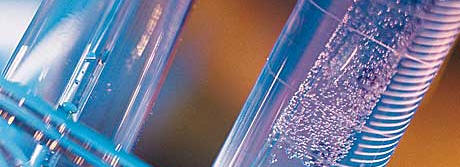
|
Eugene Dakin Ph.D., P.Chem Professional Chemist |
|
|
|
|
Oilfield Water Chemistry Oilfield water chemistry is almost completely different than water or wastewater treatment. Many areas need to be addressed when discussing water in the oilfield. Some areas include: 1) microbiological growth, 2) water injection, 3) water production, 4) scaling, 5) demulsifying water/oil, 6) corrosion, 7) oil concentration in water, and many more.
Chemicals are used to control, remove, or prevent problems with any of the aforementioned areas. Common areas that immediately are of issue to the consulting chemist are:
1) Calcium 2) Sodium 3) Iron 4) Manganese 5) Magnesium 6) Barium 7) Strontium 8) Chloride 9) Chlorine 10) Carbonate 11) Bicarbonate 12) Hydroxyl 13) Sulphate 14) pH 15) Total Suspended Solids (TSS) 16) Total Dissolved Solids (TDS) 17) Turbidity 18) Dissolved Oxygen 19) Inorganic Gases (H2S, CO2) 20) Oil Concentration 21) Microorganisms (APB, SRB) and more...
An example as to the importance of these issues, I will explore the general importance of pH.
The pH measurement is a logarithmic concentration measure of the 'acidity' or 'basicity' of hydrogen ions or hydroxyl ions present in water. A pH of 7 is neutral, while a pH of 1 is highly acidic, and a pH of 14 is highly basic. The concentration of acid is 10 times stronger at a pH of 5 than at a pH of 6.
When the pH measurement is taken for oilfield water, and the pH is below 7, there is cause for alarm. At an example pH of 4, there are usually a relatively high concentration of sour gases (H2S and CO2). These acid gases form corrosion products such as the dangerous chemical Iron Sulphide. Iron Sulphide is dangerous when there is no moisture around at room temperature, and it is exposed to atmospheric air. The Iron Sulphide will, literally, spontaneously combust. No flame is needed to cause a fire.
Also, H2S reacts with iron from the wall of the pipes to form Iron Sulphide. This is the corrosive portion of the acid gas at a pH below 7. If left untreated with chemicals, eventually enough iron will be removed to thin the pipeline to cause a rupture and possibly a spill.
To prevent this problem from occurring, and the negative environmental impact, corrosion inhibitors are periodically injected and the fluids monitored with iron, manganese, and coupons. This will determine the effectiveness of the inhibitor, and will be a proactive approach to preventing pipeline ruptures.
Due to the importance and frequent need for corrosion inhibitors, Eugene has added several calculations to his chemical programs to assist in accurate dosing in the oilfield. See the Computer section of this website.
|
|
| © 2006 - Eugene Dakin -
|
